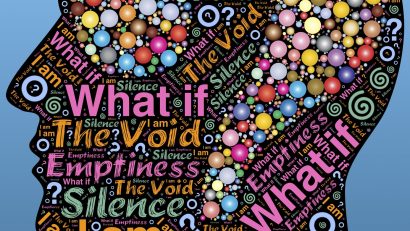They walk into the darkness, shadows on the concrete. I see shapes melt into the pavement. They appear and disappear, gray figures cast on a grayer world. They have no bodies. Forgotten, they walk amidst deserted cities, and only those who still have eyes to look and observe assist to these invisible interactions of bodiless shapes. They don’t see me, when I see them. I linger at the edge of the road, terrified that the ground is going to melt and drag me in the word of lost shadows. It happens at time, there’s so few of us left at the edges of the crumbling reality. The borderland we call it, the borderland of those who haven’t disappeared yet.
It’s the year 2050, but some argue that we cannot be sure about that either. None of us held onto our calendars, turning the pages day after day, month after month, while everybody around us disappeared. There was no point in keeping track of time when every minute that passed was another lost soul, into the concrete. At first we thought it was the pollution. People dissolved leaving only their shadows as if their souls couldn’t quite let the earth go. As their souls latched onto the planet, desperately trying to stay alive, the shadows became mere impressions of pain, shapes of black matter that could not be deleted, that could not be touched, and that could not be heard.
It soon became obvious that pollution was not the cause. We analyzed the air, the water, human and animal blood. No chemical or disease could be held responsible for such dissolution. We started blaming technology. Too many pictures had been taken and people’s images had started to wear thin. Too many flashes, selfies, video calls.
Nobody looked at each other faces. Maybe it was a simple evolutionary process; we didn’t need to look at each other, so we might as well disappear. It couldn’t be proven. So God was blamed, for those who could still blame him or her. Overpopulation was blamed. The world had only enough space to host shadows. War, famine, cruelty, fate, destiny, the Other, the neighbor; until the world became increasingly silent, and there was nobody left who could still find reasons to blame.
I used to roam the city, when I still had the courage to step around the bodiless shapes. I never understood what they were doing or if they even understood their conditions. Some of them seemed to continue with their lives. I saw them enter empty grocery stores and come out with shadow bags full of products I couldn’t see or taste. Others continued to stop and lifted their cameras up to take pictures of other shadows, with shadow cameras, with shadow hands and shadow minds.
I saw shadows jogging along silent parks in big groups. I saw shadows holding hands, disappearing into the sunset. I saw them throwing their hands in the air, turn, and storm away; abandoning a discussion I couldn’t hear. I saw storms of shadows rushing out of empty trains, holding onto shadow briefcases, cluttering escalators, elevators and crosswalks. Shadow seagulls, shadow pigeons fighting for garbage I could no longer perceive.
I couldn’t take it anymore. I’m afraid of the road now. It’s where most of us, who can still see, disappear. The road eats you whole, drags you down onto the concrete. I felt it grabbing onto my ankles, my own shadow asking me to join her. It was a scream that pierced the most deaf of ears. Most of the time, I stay at home though it’s not where I used to live before people started disappearing. I had a dog then, and a fiancé, and a sister and a mother and a world of relatives, friends, acquaintances that I use to see and talk to. It’s funny to think about it now, but I was never alone. In the material reality, the net, we were always connected. I remember talking to people, asking if they were afraid. They didn’t understand. They were convinced that it wouldn’t happen to them. It was a metaphor, something outside their narrow world of screens. I could never ask them what they thought when they joined their essence on the ground. I couldn’t ask how it was to become a metaphor.
When they left, I was unable to bare the loneliness. The shadows surrounded me, circling around me, stopping in front of me begging, asking for a kind of attention I could not give. Their voices were muted; their faces showed no expression. I couldn’t recognize them: bi-dimensional silhouettes of an inaccessible world. I stared at the blank display of my computer and my phone, waiting for an answer, an explanation. I needed somebody to untangle the mystery of the rhetorical figure of the new reality.
I left when the answer didn’t come, and the silent shadows became too loud to bear. They couldn’t shut up, but moved up and down, a dance of pain: the impossible communication between two very different worlds. I knew they wanted me to join them below, they wanted me to feel guilty for staying above ground, still walking, feet well planted.
…
There are fewer shadows here, at the edge of the city. I inhabit an old building, with Victorian windows. The sun sets behind the trees in the park. In the distance I can see the sea. A few shadows occasionally pass. Some, I think I know. Some are simply figures of a past I never encountered. The shadow of my dog followed me. I keep a picture of him in my pocket to remember his color, and his voice. He sits close to me when I look out the window. He’s quiet. He barely moves. I think he knows that he’s not the same anymore. Perhaps he understands the meaning behind the mystery. That’s how he knows I cannot pet him. Why I cannot pet the concrete.
In the beginning, it was hard to get used to the silence. It hurt my ears not to hear cars pass by, or the screaming sound of childhood laugher. The sky too was a silent vault crossed by the dark shadows of shapeless birds. I started appreciating the simple voice of the wind. The void of human presence became a needed condition. The grass acquired a voice and the leaves on the trees took on colors I had never seen before. If it wasn’t for the shadows on the concrete, I’d think that I found balance in my life. No more stimulation, no more rushing to follow impossible ideals, no more garbage, no more war or violence. Time is a linear line now, a slow process of devolution. I’m moving forward for the first time.
Yet, I cannot stop thinking about people. It’s like a past obsession, the painful attitude of a heart that strives to know, strives to look into another´s eyes. I picture long conversations, explanations and impossible resolutions. At times I can hear their voices, as if they were still with me. It usually happens when I stand in front of the window and look at the ocean. The sight of the moving water amplifies memories. It never forgets. In those moments I can hear my mother saying:
“Nothing new, doctor? Is it really irreversible?”
I perceive her agitated footsteps. I picture her worried face. Even in my mind, her face has become a fading image, a shadow. I wonder if my memory of her will also join the ground and become concrete.
“Nothing,” the immaterial doctor replies. It’s always the same conversation, the same conversation every time I stand in front of the window. It must be trying to tell me something, but I don’t understand. I hear a small sob, rushed fumbling of fabric and then I hear a door closing. The next thing I know, a shadow leaves the building stopping halfway down the path, then standing still. It´s not clear where it’s looking. I prefer to imagine it’s looking at me, for I wish that there are still eyes that can see other than mine. I remain alone with my shadow of a dog, shadows I don’t know, metaphors for this new world.
…
It’s been a long time since I have seen another person with a preserved body. I never go out nowadays. I know they are still out there. I have to believe it. They walk down the sidewalks, the highways, the avenues. They observe the same running of aimless shapes, trying to make sense of things. I know they will figure it out one day. I know they will extend their hands to help us out of the shadows. Only then, will I leave this building, unafraid to step on the concrete. You can see them, ghosts among the shadows. They keep their hands inside their pockets, and their shadows a few steps behind, mixing with concrete.


